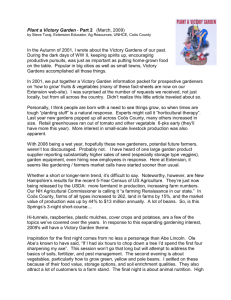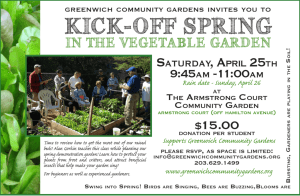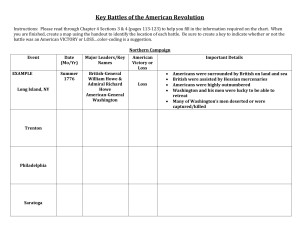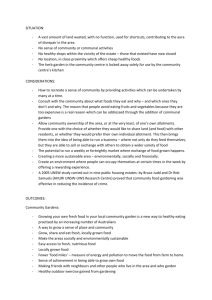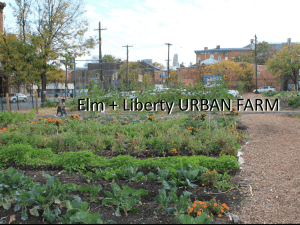www.foodandsocietyfellows.org UC Advisor Encourages Victory
advertisement
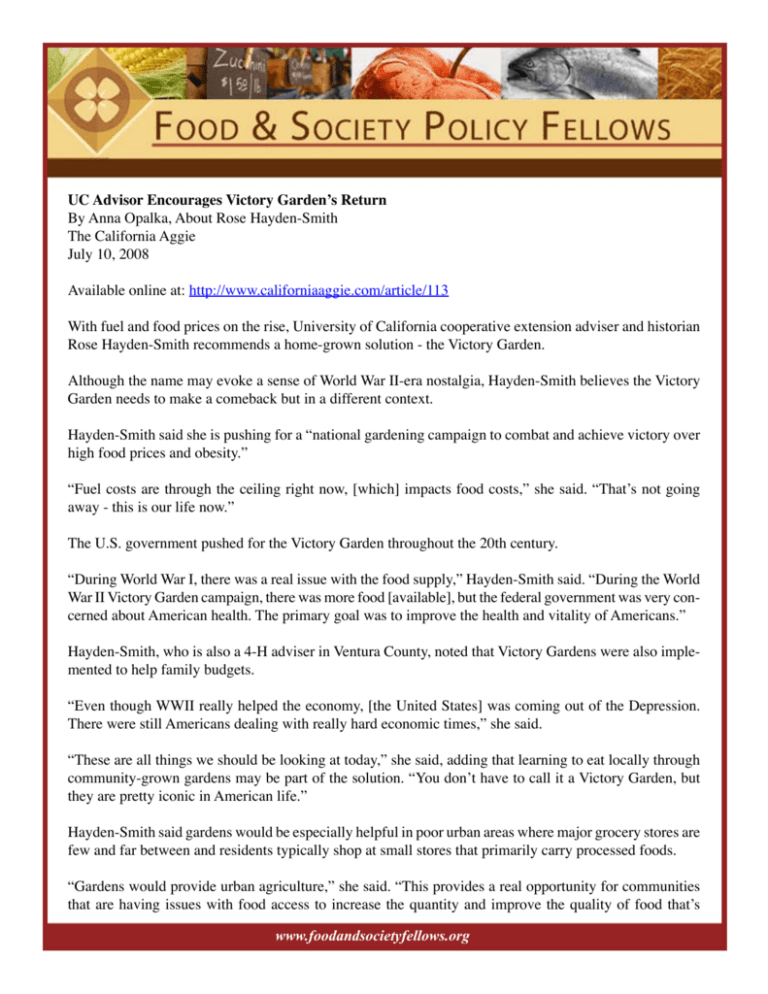
UC Advisor Encourages Victory Garden’s Return By Anna Opalka, About Rose Hayden-Smith The California Aggie July 10, 2008 Available online at: http://www.californiaaggie.com/article/113 With fuel and food prices on the rise, University of California cooperative extension adviser and historian Rose Hayden-Smith recommends a home-grown solution - the Victory Garden. Although the name may evoke a sense of World War II-era nostalgia, Hayden-Smith believes the Victory Garden needs to make a comeback but in a different context. Hayden-Smith said she is pushing for a “national gardening campaign to combat and achieve victory over high food prices and obesity.” “Fuel costs are through the ceiling right now, [which] impacts food costs,” she said. “That’s not going away - this is our life now.” The U.S. government pushed for the Victory Garden throughout the 20th century. “During World War I, there was a real issue with the food supply,” Hayden-Smith said. “During the World War II Victory Garden campaign, there was more food [available], but the federal government was very concerned about American health. The primary goal was to improve the health and vitality of Americans.” Hayden-Smith, who is also a 4-H adviser in Ventura County, noted that Victory Gardens were also implemented to help family budgets. “Even though WWII really helped the economy, [the United States] was coming out of the Depression. There were still Americans dealing with really hard economic times,” she said. “These are all things we should be looking at today,” she said, adding that learning to eat locally through community-grown gardens may be part of the solution. “You don’t have to call it a Victory Garden, but they are pretty iconic in American life.” Hayden-Smith said gardens would be especially helpful in poor urban areas where major grocery stores are few and far between and residents typically shop at small stores that primarily carry processed foods. “Gardens would provide urban agriculture,” she said. “This provides a real opportunity for communities that are having issues with food access to increase the quantity and improve the quality of food that’s www.foodandsocietyfellows.org available to urban populations.” College students can join the effort, too. “If you don’t have a lot of space, you can [grow vegetables] in a container,” Hayden-Smith said. Hayden-Smith thinks UC Davis is already on the right track. “The Davis campus is just amazing in terms of the awareness of sustainable food systems and the importance of nutrition,” she said. Hayden-Smith, who has been thinking about reviving Victory Gardens for the last several years, said she is working with several other garden supporters to push for a national campaign. “We are not a formal group, but there are a number of people nationwide who have found each other through electronic communication,” she said, explaining that the group tries to get the word out through talks, websites and blogs. The revitalization of Victory Gardens has already started; Earlier this month, efforts began to replant a Victory Garden in front of San Francisco City Hall - the same place as the original 1940’s garden. Led by nonprofit organization Slow Food Nation, which promotes sustainable food practices, the project is made possible by a collaboration of various San Francisco Bay Area and national organizations, including the San Francisco mayor’s office. The produce is expected to be harvested and donated to those in need in late September. “The food grown in the garden will be donated to those with limited access to healthy, organic produce through a partnership with the San Francisco Foodbank,” said Leigh Farris, communications consultant with Slow Food Nation in an e-mail interview. It doesn’t necessarily have to go by the name “Victory Garden.” Diane Rake, a volunteer with the UC Master Gardener program, is involved with a similar project in West Sacramento. The garden is sponsored by the Catholic organization Families in Self Help, and is organized by Sister Cora Salazar. Rake said that the goal behind the project is to help the people make ends meet and to be self-sustaining. She added that the end result is that they would have food on their table that they may not have otherwise. Rake said she primarily works with immigrant groups such as the Vietnamese and the Mien. “[The garden] is growing beautifully right now,” Rake said. “Corn, squash, watermelon - a lot is for their www.foodandsocietyfellows.org own tables.” Any extra vegetables will be donated to a local elementary school located behind the garden, she said. For more information on Victory Gardens, visit Hayden-Smith’s website at groups.ucanr.org/victorygrower. ANNA OPALKA can be reached at features@californiaaggie.com. www.foodandsocietyfellows.org
